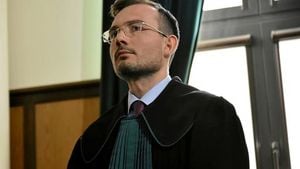In a significant turn of events in German politics, the recent election of Friedrich Merz as Chancellor has sparked renewed discussions regarding the relationship between the Union and the Left Party (Die Linke). On May 6, 2025, Merz, needing two attempts to secure his position, found unexpected support from the very party his coalition typically rejects.
During the first round of voting, Merz failed to achieve the necessary majority. This unprecedented situation led to urgent negotiations among the Union, the Social Democrats (SPD), and the Greens, with the Left Party stepping in to facilitate a second ballot. The Union’s need for a two-thirds majority to amend procedural rules highlighted the shifting dynamics in the Bundestag.
CSU leader Markus Söder has publicly dismissed the notion of a change in course regarding cooperation with the Left Party, stating that the agreement reached in the Bundestag implied "gar nichts" (nothing). He emphasized that discussions were merely procedural, expressing skepticism about any potential collaboration, particularly on issues like defense spending, where he sees no common ground. "I wouldn’t know what connects us with the Left Party," Söder remarked, underscoring his party's long-standing opposition to engaging with the Left.
However, Alexander Dobrindt, the new Federal Minister of the Interior, has suggested a more pragmatic approach. He indicated that future discussions with the Left may be necessary to secure two-thirds majorities in critical votes. "Where two-thirds majorities are needed, we will have to talk to people—regardless of whether their political color suits us at the moment," Dobrindt stated.
Adding to the complexity, Kanzleramtsminister Thorsten Frei has called for a reevaluation of the CDU's stance towards the Left Party, established in a 2018 party resolution that excludes any cooperation. "We will have to discuss this together," Frei said, acknowledging the changing political landscape that necessitates a fresh look at established positions.
Despite these calls for dialogue, CDU Secretary Carsten Linnemann firmly stated that the Unvereinbarkeitsbeschluss (incompatibility resolution) remains in effect. He reiterated this commitment during an appearance on the ZDF talk show "Markus Lanz," where he emphasized that he has no contact with any representatives of the Left Party, reflecting the party's reluctance to engage with what it views as extremist elements.
The day of the Kanzlerwahl was marked by intense political maneuvering. After Merz's initial failure, the Union and SPD needed to secure the Left's assistance to facilitate a second vote. This cooperation, however, was met with criticism from the Alternative for Germany (AfD), whose leader Alice Weidel accused the Union of betraying its voters by seeking an alliance with the Left. "The CDU is now looking to partner with the Left because it is already apparent that governing with the small coalition of Union and SPD is hardly feasible," Weidel wrote on social media.
In a remarkable shift, Heidi Reichinnek, the leader of the Left Party's parliamentary group, welcomed the Union's newfound willingness to engage. She argued that the Unvereinbarkeitsbeschluss was outdated and impractical, saying, "The Union will have to drop its ideological blinders." Reichinnek expressed her party's readiness for discussions aimed at achieving real change in areas like debt reform and the appointment of constitutional judges.
The political landscape is evolving, and the Left Party's involvement in the recent election process has raised expectations for future collaboration. Ines Schwerdtner, the leader of the Left Party, urged the Union to engage more consistently, stating, "Democratic parties should be able to talk to each other." This sentiment reflects a growing recognition that pragmatic solutions may require collaboration across the political spectrum.
Political analysts have noted that the events surrounding the Kanzlerwahl indicate a potential shift in the CDU's approach to the Left Party. Thorsten Faas, a political scientist, pointed out that the Union's handling of the Unvereinbarkeitsbeschluss on such a critical day suggests a necessity for political pragmatism. "One can be curious whether this will lead to a change in course," Faas remarked.
As the dust settles from the dramatic events of May 6, the implications for the future of German politics remain uncertain. The CDU's traditional stance against the Left Party may be challenged as the realities of governance demand cooperation in an increasingly fragmented political landscape. The question now is whether the Union will adapt its strategies to reflect these new dynamics or continue to uphold its historical positions.
The interactions between the Union and the Left Party, once considered unthinkable, may pave the way for a new political reality in Germany. With the stakes higher than ever, the coming weeks will likely reveal whether this moment marks a genuine shift in political alliances or merely a temporary necessity born of circumstance.





